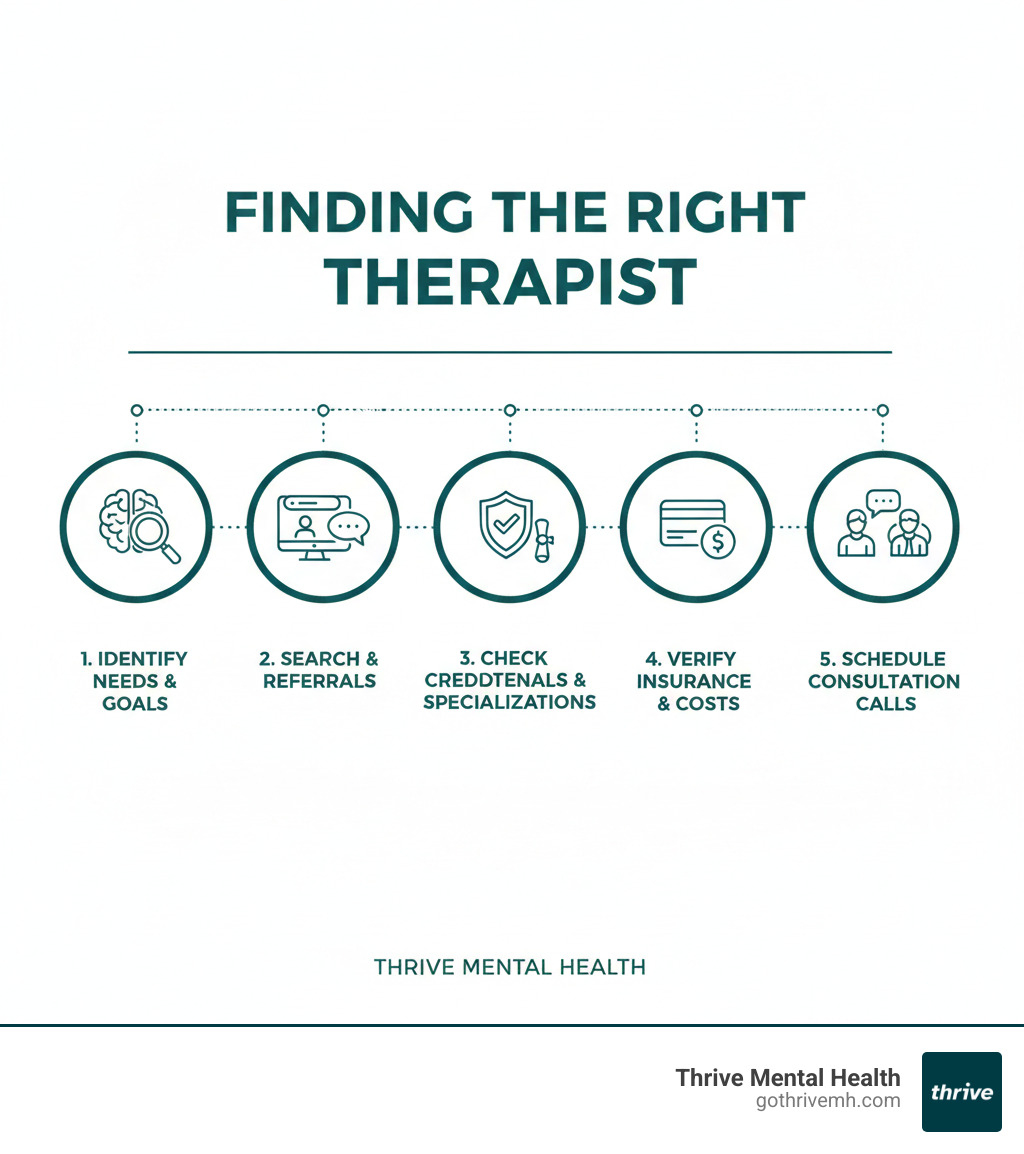How to Find a Therapist: Psychology Today & Beyond

Therapist Near Me: Your 5-Step Guide to Healing
Your Search for a Therapist Starts Here
Finding a therapist near me in Florida can feel overwhelming when you’re already struggling. This guide will simplify the process.
Crisis Support: If you are in crisis or may have an emergency, call 911. If you’re having suicidal thoughts, call or text 988 to connect with a trained counselor anytime.
Here are the quick steps to find a therapist who fits your needs:
- Use online directories: Psychology Today, your insurance provider’s website, and the Florida Psychological Association are great places to start.
- Get referrals: Ask your doctor, trusted friends, or your company’s Employee Assistance Program (EAP).
- Check credentials: Look for licensed professionals like LCSW, LMFT, LPC, or PhD/PsyD.
- Verify insurance: Confirm your coverage with your insurance provider or the therapist’s office.
- Schedule consultations: Most therapists offer a brief, free call to see if it’s a good fit.
Seeking professional help is a brave step toward reconnecting with yourself and finding belonging. This guide, written by the clinical team at Thrive Mental Health, will walk you through finding quality mental health care in Florida without the stress. We’ve seen how the right therapeutic match can transform a person’s ability to heal and grow, and we want to help you find yours.

First, Know Thyself: What Do You Need from Therapy?
Before searching for a therapist near me, take a moment for self-reflection. Try shifting from self-criticism to gentle curiosity. Instead of judging yourself for struggling, ask: “What am I feeling?” or “What would help me feel more like myself?”
This compassionate shift is where healing begins. Therapy isn’t about “fixing” you; it’s about reconnecting with your strengths and learning new ways to steer life’s challenges. You may need support if your usual coping strategies aren’t working, you feel disconnected, or daily life feels overwhelming.
Signs of Anxiety
Anxiety is more than just worry. It’s a persistent state that can disrupt your life. Common signs include:
- Persistent worry: Intrusive, uncontrollable thoughts, even when things seem fine.
- Restlessness: A keyed-up feeling of being unable to settle down.
- Difficulty concentrating: Your mind jumps from one thought to another.
- Irritability: Snapping at loved ones over small things.
- Sleep disturbances: Racing thoughts that keep you awake or wake you up at night.
Signs of Depression
Depression is a lingering low mood that doesn’t lift, even when good things happen. Key signs are:
- Low mood: A heavy, empty feeling that persists.
- Loss of interest: Activities you once enjoyed now feel like a chore.
- Changes in appetite or sleep: Eating or sleeping much more or less than usual.
- Fatigue: Even small tasks feel exhausting.
- Feelings of worthlessness: Excessive guilt or a harsh inner critic.
Signs of Trauma

Trauma from distressing events can have lasting effects. These may include:
- Intrusive memories: Unwanted flashbacks, nightmares, or thoughts about the event.
- Avoidance: Steering clear of people, places, or activities that are reminders of the trauma.
- Negative changes in mood: Persistent negative beliefs about yourself or the world and difficulty feeling positive emotions.
- Hypervigilance: Feeling constantly on guard, easily startled, or scanning for danger.
These experiences can keep you stuck. A specialized, trauma-informed therapist understands these impacts and can help you heal. For more information, organizations like the Sidran Institute for Traumatic Stress offer valuable resources.
For a deeper dive into identifying your needs, check out our guide: Find the Best Mental Health Therapist Near You.
Where to Find a Therapist Near Me [Online & Local Directories]
Now that you know what you’re looking for, let’s find a therapist near me in Florida. With more resources available than ever, the key is to search effectively.

While online therapy offers great accessibility, some prefer in-person sessions. Using search filters is your superpower for narrowing down the options.
How to Find a Therapist Near Me Using Online Directories
Online directories are the smartest way to start your search. They allow you to filter by location, specialty, insurance, and more.
- Psychology Today: This is one of the most popular directories. You can search by city, insurance, issues treated, and therapeutic approach. It’s especially useful for finding local therapists in Florida, from Miami to Jacksonville.
- Professional Association Directories: The American Psychological Association psychologist locator is a reliable source for finding licensed psychologists who meet high ethical and educational standards.
- Your Insurance Provider’s Portal: Using your insurance company’s “Find a Provider” tool is the best way to ensure your therapy is covered, saving you money and hassle.
- Localized Google Searches: Simple searches like “trauma therapist Miami” or “anxiety therapy Orlando” can yield excellent results for specialists in your area.
State and Local Resources
Beyond national directories, look for local resources that understand your community.
- Florida Psychological Association: The FPA website has a directory of licensed local practitioners, making it a reliable resource for finding qualified therapists in the state.
- Community Mental Health Centers: These centers across Florida often provide affordable or sliding-scale services and are an excellent starting point if cost is a major concern.
Other Avenues for Finding Support
Sometimes the best referrals come from people and programs already in your corner.
- Primary Care Doctor: Your doctor knows your health history and can often refer you to trusted local therapists.
- Employee Assistance Programs (EAP): Check if your employer offers an EAP. These programs typically provide a set number of free, confidential counseling sessions and referrals.
- University Counseling Centers: If you’re a student, your university’s counseling center offers accessible, low-cost, or free services custom to student life.
Virtual options have made distance less of a barrier to care. To learn more, explore our guide on Virtual Therapy: A Convenient and Effective Approach to Counseling.
Vetting Your Options: How to Choose the Right Therapist
Finding names is the first step; now it’s time to find the right fit. The connection you have with your therapist, known as the therapeutic alliance, is a top predictor of success. It’s about feeling safe, understood, and supported in a confidential space.

At Thrive Mental Health, we focus on evidence-based practices—therapies backed by research—to help you achieve the change you want. Choosing the right therapist means looking at their credentials, approach, and whether you feel comfortable with them.
Decoding the Letters: Credentials, Specializations, and Therapy Styles
The alphabet soup of credentials can be confusing. Here’s a quick breakdown:
| Credential Type | Description | Common Roles & Focus |
|---|---|---|
| Psychologist (PhD/PsyD) | Doctoral degree, extensive training. | Psychological testing (ADHD, etc.), diagnosis, psychotherapy. |
| Psychotherapist (LMFT, LCSW, LPC, LMHC) | Master’s degree, supervised clinical hours. | Talk therapy for individuals, couples, and families. |
| Counselor (LPC, NCC) | Master’s degree, supervised practice. | Focus on personal growth, grief, stress, and life transitions. |
| Social Worker (LCSW, LSW) | Master’s (MSW) or Bachelor’s (BSW) degree. | Therapy, case management, advocacy, connecting to resources. |
| Psychiatrist (MD) | Medical doctor specializing in psychiatry. | Diagnose conditions and prescribe/manage medication. |
Look for specializations that match your needs, such as trauma, anxiety, depression, or relationships. Also, consider their therapeutic orientation, or the framework they use. Common approaches include:
- Cognitive Behavioral Therapy (CBT): Focuses on changing negative thought patterns and behaviors.
- Dialectical Behavior Therapy (DBT): Helps with emotion regulation and distress tolerance.
- EMDR (Eye Movement Desensitization and Reprocessing): An evidence-based therapy for processing traumatic memories.
Making it Work: Finding a Therapist Who Fits Your Budget
Cost is a real concern. Sessions can range from $100-$200+, though online therapy is often more affordable at $65-$100 per session.
- Use Your Insurance: Most health benefit plans cover therapy. Thrive Mental Health works with major providers like Cigna, Optum, and Florida Blue. You can verify your insurance in 2 minutes (no obligation) to see what your plan covers.
- In-Network vs. Out-of-Network: In-network providers are cheaper. Out-of-network may be partially covered, but you’ll likely pay more upfront.
- Sliding Scale Fees: Many therapists adjust their fees based on your income. Don’t hesitate to ask about this option.
- Key Payment Questions: Ask about their fee, if they offer a sliding scale, what insurance they accept, and their cancellation policy (usually 48 hours notice is required).
For more on managing costs in Florida, read our guide on Florida Adult Mental Health.
The “Click” Factor: Nailing the 15-Minute Consultation
Use the free 15-minute consultation to see if you “click” with the therapist. This is your chance to assess comfort, connection, and their approach.
Key questions to ask:
- What is your experience with my specific concerns (e.g., trauma, anxiety)?
- What therapeutic approaches do you use?
- What are your fees, and do you offer a sliding scale?
- What is your availability for sessions?
The goal is to find someone you trust and feel comfortable with. This call lays the foundation for a successful therapeutic relationship. For more guidance, explore our article: Virtual Therapy: A Convenient and Effective Approach to Counseling.
Beyond the Basics: Finding Specialized Therapy for Your Unique Needs
Sometimes, a general search for a therapist near me isn’t enough. Finding a therapist who understands your cultural background, identity, or specific life experiences can be essential for building trust and making therapy effective.
We are all wired for connection and growth. Having a therapist who understands your unique context can be profoundly empowering on that journey.
Therapy for People of Color (POC), LGBTQIA+, and Veterans
Finding a therapist who shares your lived experience means you don’t have to explain the basics of your world. These resources can help bridge the representation gap in mental health:
- For People of Color: Therapy for Black Girls connects Black women with culturally competent therapists, while Therapy for Latinx offers services that consider the unique experiences of Latino communities.
- For LGBTQIA+ Individuals: The National Queer and Trans Therapists of Color Network serves those at the intersection of multiple identities. Finding an affirming therapist means working with someone who understands that your identity isn’t the problem.
- For Veterans: The Department of Veterans Affairs provides specialized, trauma-informed care. These therapists understand military culture, combat trauma, and the challenges of transitioning to civilian life.
Thrive Mental Health’s virtual programs make it easier for Florida residents to connect with specialized therapists, breaking down geographical barriers to finding the right fit.
Higher Levels of Care: IOP and PHP
When weekly therapy isn’t enough, more intensive programs can provide the structured support you need.
- Intensive Outpatient Programs (IOP): These programs involve several hours of therapy per day, a few days a week. IOP allows you to receive intensive treatment while still living at home and managing daily responsibilities.
- Partial Hospitalization Programs (PHP): Offering an even higher level of care, PHPs typically involve full-day treatment sessions five days a week. They provide a therapeutic environment focused on stabilization and skill-building while you return home in the evenings.
Both IOP and PHP use evidence-based therapies proven to be effective for severe anxiety, depression, and trauma. Thrive Mental Health offers both virtual and in-person IOP and PHP programs in Florida, including evening options for busy adults and young professionals.
For a deeper look at these options, explore our guide: Understanding Mental Health Facilities Services.
Frequently Asked Questions about Finding a Therapist
Here are answers to the most common questions people have when searching for a therapist near me.
What is the difference between a psychologist, a therapist, and a counselor?
While all are trained to provide mental health support, their education differs. Psychologists have a doctoral degree (PhD/PsyD) and can perform psychological testing. Therapists and counselors typically have a master’s degree (LCSW, LMFT, LPC) and focus on providing talk therapy. The best fit depends on your specific needs, not just the letters after their name.
How much does therapy typically cost without insurance?
Without insurance, therapy sessions often cost $100 to over $250. However, many therapists offer sliding scale fees based on income, so it’s always worth asking. Online therapy can also be a more affordable option, often ranging from $65-$100 per session. At Thrive Mental Health, we work with providers like Cigna, Optum, and Florida Blue. You can verify your insurance in 2 minutes with no obligation to see what your plan covers.
How do I know if a therapist is a good fit for me?
A good fit comes down to trust, comfort, and feeling understood. During your initial consultation, trust your gut. Ask yourself: Do I feel safe and heard? Does their style resonate with me? It’s normal to try a few therapists before finding the right one. A good therapist will want you to find the best match for you.
Is online therapy as effective as in-person therapy?
Yes. Numerous studies show that for many conditions like anxiety and depression, online therapy is just as effective as in-person therapy. The quality of the therapeutic relationship is what matters most, not the location. Online therapy also offers convenience and flexibility. Our virtual therapy programs are designed to provide Florida residents with the same safe, connected experience as in-person sessions.
Your Path to Healing and New Beginnings
Finding the right therapist near me in Florida is a courageous step toward the life you want. The journey starts by approaching yourself with curiosity instead of criticism, creating space for real growth. Therapy is not about fixing something broken; it’s about reconnecting with yourself, processing difficult experiences, and developing new strategies to thrive.
Taking the first step is often the hardest, but it can lead to better relationships, solutions to long-standing problems, and a profound sense of well-being. You now have the tools to find quality care in Florida that fits your life and your needs.
Ready for support? Thrive Mental Health offers virtual and hybrid IOP/PHP in Florida with evening options. Verify your insurance in 2 minutes (no obligation) → Start benefits check or call 561-203-6085. If you’re in crisis, call/text 988.